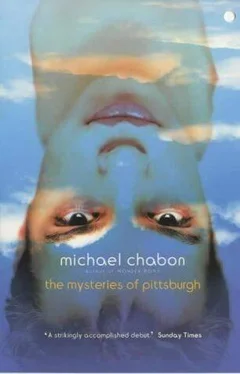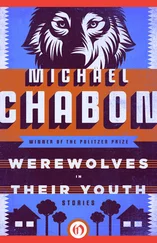Michael Chabon - The Mysteries Of Pittsburgh
Здесь есть возможность читать онлайн «Michael Chabon - The Mysteries Of Pittsburgh» весь текст электронной книги совершенно бесплатно (целиком полную версию без сокращений). В некоторых случаях можно слушать аудио, скачать через торрент в формате fb2 и присутствует краткое содержание. Жанр: Современная проза, на английском языке. Описание произведения, (предисловие) а так же отзывы посетителей доступны на портале библиотеки ЛибКат.
- Название:The Mysteries Of Pittsburgh
- Автор:
- Жанр:
- Год:неизвестен
- ISBN:нет данных
- Рейтинг книги:5 / 5. Голосов: 1
-
Избранное:Добавить в избранное
- Отзывы:
-
Ваша оценка:
- 100
- 1
- 2
- 3
- 4
- 5
The Mysteries Of Pittsburgh: краткое содержание, описание и аннотация
Предлагаем к чтению аннотацию, описание, краткое содержание или предисловие (зависит от того, что написал сам автор книги «The Mysteries Of Pittsburgh»). Если вы не нашли необходимую информацию о книге — напишите в комментариях, мы постараемся отыскать её.
The Mysteries Of Pittsburgh — читать онлайн бесплатно полную книгу (весь текст) целиком
Ниже представлен текст книги, разбитый по страницам. Система сохранения места последней прочитанной страницы, позволяет с удобством читать онлайн бесплатно книгу «The Mysteries Of Pittsburgh», без необходимости каждый раз заново искать на чём Вы остановились. Поставьте закладку, и сможете в любой момент перейти на страницу, на которой закончили чтение.
Интервал:
Закладка:
"What is it? Art. Come on. Don't cry."
"I don't know what I'm like anymore," I said. "I do dumb things."
"Shh."
"Don't ask me to choose. Please."
"I won't," he said, shortly, as though it cost him some effort. "Just don't leave me."
I stopped crying. Everything seemed utterly upside down. The Arthur I thought I knew would be scorning me now, and ridiculing Phlox, and forcing me to admit that she'd suckered me. He would be forcing me to acknowledge that if I didn't love him, Arthur F. Lecomte, with all the hip places he had been, the perfect manner of the life he led, his sarcastic brilliance, his hard amusement, and, most of all, the male company he could offer me, then I was a fool, a loser, and entirely my father's obedient boy; cursed, doomed to lose the things my father had lost-art, love, integrity, and all that. A shift, another shift, had taken place. Somehow it was up to me now, and I wanted to know why.
"Did something else happen to you today?" I said. "Something with Riri?"
Arthur sat down on a step and looked down onto the miniature lights of the Lost Neighborhood.
"I took this test," he said. "I didn't tell you. I took the foreign service exam. I failed. I knew when I came out of the room, really, but I got the letter this afternoon."
I sat beside him and put my arm across his shoulders.
"So? You can take it again, can't you?" I tried to think of when he must have taken it.
"I'm twenty-five. I'm still in college. I'm queer. My lover is about to leave me for Deanna Durbin." He threw a stone. "I've been chasing after the same things for a long time now."
"I love you," I said.
"You're a sexual dilettante," he said. "You have no idea."
We made love on the steps. I threw up. He walked me home, told me a bad joke, and we climbed into my narrow bed. In two hours there was daylight at the window and a Wedgwood sky.
22. The Beast That Ate Cleveland
I imagine it was shortly before dinnertime on the twenty-third of August that Cleveland reentered the world of his earliest childhood, intent on doing it harm. Until just a few days before this, I think, he hadn't set foot in Fox Chapel in years and years, not since the distant winter morning on which the Arnings had moved out to the country, and he'd sat in his little rubber boots and silken, pillowy snowsuit in the back seat of the family car, bewildered, watching the bare window of his bedroom disappear. Now his boots were of black leather, the air smelled like perfect lawns, and he, Evil Incarnate, knew exactly where he was going. He went slowly, keeping a light hand on the throttle so that the giant growls of his German engine wouldn't draw too much notice. As though his opaque helmet were not disguise enough, he'd cut his hair short, had traded his glasses for a pair of contacts, his black jacket for a twill sport coat, and as he pulled off into the parking lot of a mock-Tudor shopping center whose rustic, pretty stores sold things of no practical use, potpourris, artificial eggs, duck-related merchandise, he did his best to look like the wayward, thrillhound son of a well-to-do Fox Chapel family-one of the local young black sheep who were always flipping over in their Italian cars on winding roads, vomiting on the golf courses at night, diving fully clothed and drunken into the runs and creeks-one of whom, really, he was. Only in my hands, he thought as he killed the engine, it goes further than simple bad behavior. It is an intellectual and moral program. It is the will to bigness.
He shed his helmet, left his bike in a space around the back of the shopping center, near the Dumpsters, where Tudor ended and blank cinder block began. Then he stood for a moment, patting at his jacket. Gloves, flask, penlight, pocketknife, Poe. From the straps that held it to the saddle he drew a little crowbar and slid it under his watchband, up into his sleeve, until it jabbed at the soft crook of his arm.
A wood began behind the shopping center, fairly dense with pin oak and brambles, shot through with tiny rills, but he knew that it held sudden clearings, it was passable, and that it continued for almost two miles until it stopped abruptly at a certain concrete wall whose dimensions, by now, he knew quite well. He grinned at the sight of the colonnade of trees before him, he dallied a minute more to enjoy the quick leap of his heart and the warmth that mounted in his stomach. Although he supposed it was a stupid thing to have done, he was what he was-so on the way over he'd stopped at a bar for two lucky shots of Jameson's Irish whiskey, and now, drawing a hot half-inch from his own flask and contemplating the lovely, dark world he was about to enter, he was filled with alcoholic courage; with a habitual head toss, he started into the trees, twigs crunching underfoot; but he no longer owned his tossing long hair, and he rubbed at the bristly back of his head.
The trip through the woods took him a little over an hour, so he had far more than enough time to think about what he was about to do, and anyway I think he loved the act of considering himself a jewel thief, like this: "I am a jewel thief"; for he was learning a profession, and, as with doctors, and priests, and the other few true professionals (people, that is, who are trained to recognize peril), merely pronouncing the words "jewel thief" served him as a kind of instantaneous reminder of his many skills and responsibilities, as a restorative slap. It jerked him into bleak, hungry readiness, like the snap of the wrist that frees the humming switchblade.
Twice or three times the odd cry of a bird, the yell of a jay, would stop him dead, and he'd duck behind a tree for several seconds, watching, breathing. He wasn't frightened by the many things that could go wrong in the natural course of a job, because these things were more or less the whole point, along with the proverbial fat wads of dough. But he'd been troubled, even mildly spooked, by his teacher Pete Areola's uncharacteristic anxiety during the previous couple of days. Somebody had been telling Poon to watch his step, to keep a leash on his protégés, and although Punicki laughed and told Pete to tell Cleveland not to worry, he'd also set up elaborate precautions for the fencing later on that night. Areola, ex-Special Forces, trained to steal by the army and then set loose, said it was Frankie Breezy making vague, "probably bullshit" threats, but Cleveland had a dim suspicion that my father might be lurking somewhere behind them, as he clutched a tree and listened hard.
When he drew near the house, however, his mind cleared again, his heart hardened, and he began to apply himself to his task. There was a young oak five or six feet from the base of the concrete wall; he grabbed its lowest limb and yanked himself up, then inched forward along the limb until he was almost level with the wall's lip. He studied the house that stood not sixty feet from his already damp forehead. The bough rocked under his weight. It was a great brick house, red and hung with ivy, two dozen windows in the back alone, three chimneys. Areola had chosen it, after their sightseeing tour a few days before, because there appeared to be no guard dogs. Perhaps their last adventure with the snarling bitch in the back of the truck had been a near disaster, or perhaps she was no longer in heat; in any case, they were for the moment unprepared to deal with Dobermans. Cleveland loved dogs, of course, and would never have employed the poisoned wiener.
All of the downstairs lights were on, all of the upper windows dark, as he'd hoped and expected-it was dinnertime, and Cleveland could see them, Dad, Mom, Junior, Sis, and Baby, sitting around the vast dining room table with their beautiful food, could see the uniformed maid disappear through swinging doors into the kitchen (glimpse of copper pots, flowery wallpaper), and he felt briefly wistful at the familiar sight of the father and the son, and the butter being passed in silence along the unbridgeable distance between them. He spat thick whiskey spit, then climbed out onto the top of the wall, squatting. He looked down along the wall's inner face, to the grass by its foot, for signs that the perimeter was alarmed, though he knew that if there were an alarm system, it would not be activated, surely, at this hour of happiness and safety; but there were no such signs, and he let himself slowly down into the hostile territory of the well-groomed yard.
Читать дальшеИнтервал:
Закладка:
Похожие книги на «The Mysteries Of Pittsburgh»
Представляем Вашему вниманию похожие книги на «The Mysteries Of Pittsburgh» списком для выбора. Мы отобрали схожую по названию и смыслу литературу в надежде предоставить читателям больше вариантов отыскать новые, интересные, ещё непрочитанные произведения.
Обсуждение, отзывы о книге «The Mysteries Of Pittsburgh» и просто собственные мнения читателей. Оставьте ваши комментарии, напишите, что Вы думаете о произведении, его смысле или главных героях. Укажите что конкретно понравилось, а что нет, и почему Вы так считаете.












